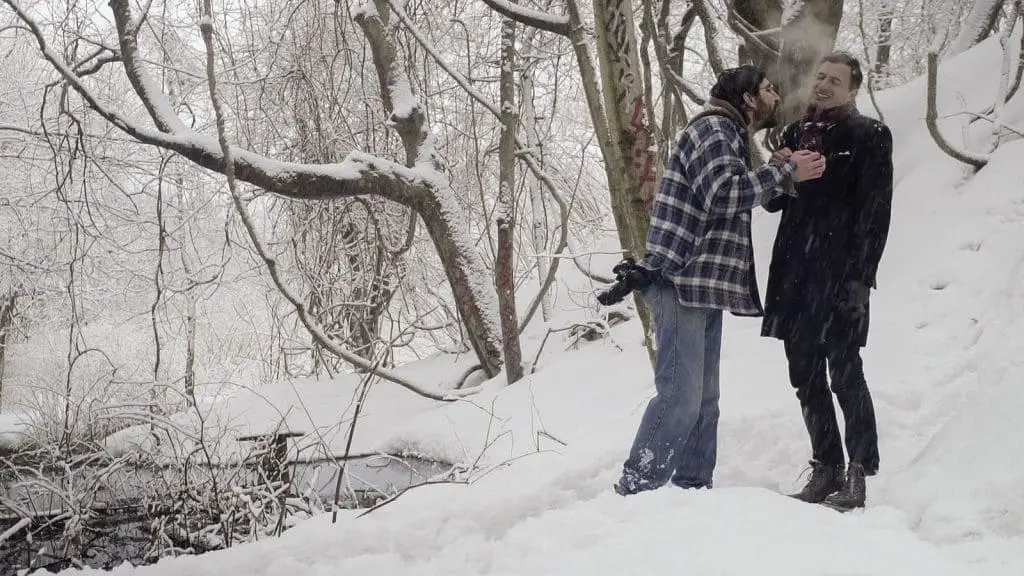
Remember that disaster that hit the U.S. gulf coast a few years ago? You know, the one where thousands of people were displaced and our government sat on their hands as people died, lost their houses, families, livelihoods and had nowhere to go? I think it was called…Hurricane Katrina? Ring a bell? Anyone? Well if it does, that’s good because everyone seems to have forgotten about it which is why the amazing film “Low and Behold” is one of the truly great movies of 2007.
Taking place just after the horrendous hurricane has destroyed portions of New Orleans, a slew of scabs looking to make a quick buck off the loss of house and home descend on the city. Amongst them is young Turner Stull (Jacobs) who takes a job with his Uncle E.D. ‘Stully’ Stull (Longstreet) as an insurance claims adjuster. Does young Stull have any experience in the claims adjusting business? Not really, aside from a three day training. But in desperate times, desperate people take desperate measures and that goes for both the Stull’s who are flat broke and the people who have lost their houses in the hurricane.
“Low and Behold” works on several different levels. Firstly, I love the low key attitude it has. The film seems to be working off of a script, but there’s a ton of apparent improv as well as actual documentary footage with New Orleans residents post-Katrina. It all blends together to make for a very realistic film. Barlow as Turner Stull is hilarious as he tries to earn a living that’s akin to Sisyphus rolling his rock up the hill. With so much destruction and anger from residents, the task of looking at destroyed houses to see how screwed these people are going to get is a comedy of errors. But obviously, it’s really not funny at all and that’s where “Low and Behold” shows a huge heart.
Stull meets local resident Nixon (played by Eddie Rouse in a role that should get him an Independent Spirit Award) who spends every day looking for his lost dog. His kids miss the pooch something awful and even after working the night shift at a local box factory, Nixon finds the time and energy to continue his search. While an obvious allegory to the loss the New Orleans residents felt after the disaster, there’s also a very sad and serious undertone to his search for his dog. We never see Nixon’s family or him at work and as the film moves forward, we begin to wonder if they exist. Nixon forms a friendship of favors with Turner- he helps him find the houses on his insurance claims list and at days end, Turner helps Nixon look for his dog.
As New Orleans residents, the filmmakers Jacobs and Godshall are certainly not immune to the politics involved in getting New Orleans back on it’s feet and they certainly share in the frustration and anger that has built up after years of no one doing anything. Yet rather than club you over the head with a message, “Low and Behold” brings you in through solid characters and a compelling story. As the film moves along and you get to know Turner and Nixon, you find yourself involved not only in the plight of the characters, but also in the plight of residents of New Orleans. Even more impressive is the way “Low and Behold” sneaks up on you and hits you like a ton of bricks by films end.
This is the kind of film that simply must be seen by anyone and everyone. That may sound like hyperbole, but I truly believe it. “Low and Behold” is important as a political statement as well as in and of itself as an excellent indie film. Other than Spike Lee and the ill-scripted television show “K-Ville,” no one is talking about New Orleans any more and that’s just wrong. This American city still needs our help and an ideological fight over the city’s fate has only just begun. For these filmmakers to take on such a serious subject and bring it to the screen in a truly heartfelt way is something special and I hope “Low and Behold” continues o wow festival audiences before finding success on the DVD market.
